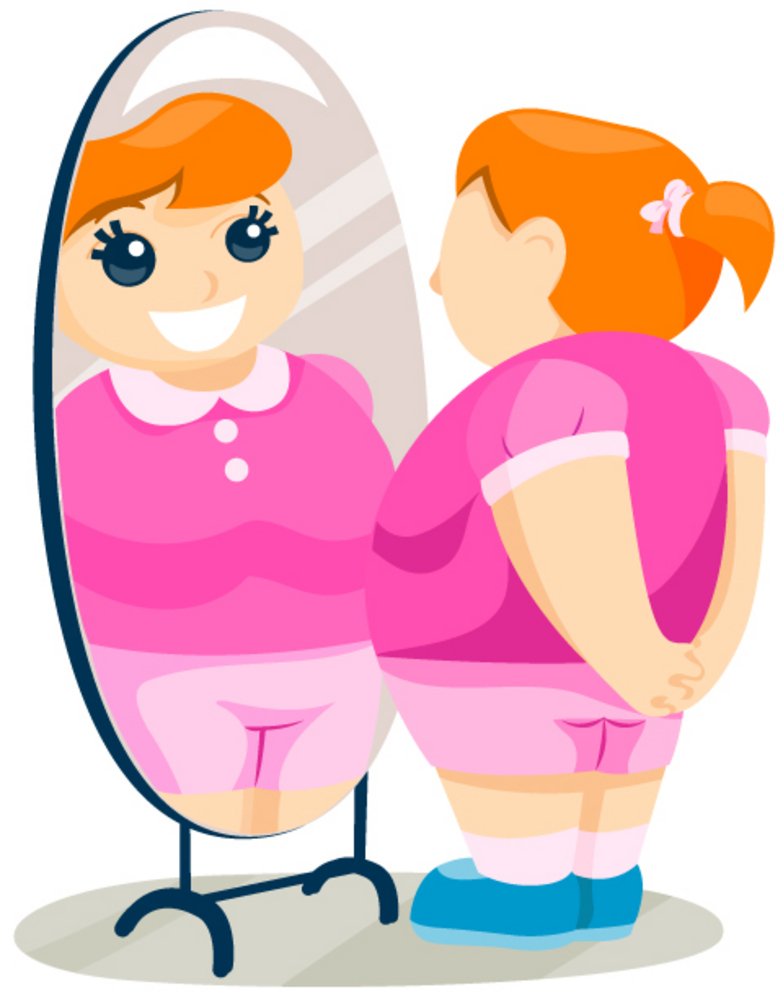When we think of someone with a distorted body image, the first thing that comes to mind is likely a girl with an eating disorder such as anorexia. It is hard to imagine how they can look in a mirror and not see the skin and bones they’ve become. But apparently, it is not just the kids who starve themselves who have a false perception of their size and appearance. New research has found that most overweight children do not consider themselves heavy.
The study, which took place at the Centers for Disease Control and Prevention in Atlanta, Georgia, showed that the vast majority of children and teenagers who are overweight firmly believe that their weight is actually normal.1 Rettner, Rachael. “Most overweight kids don’t think they’re heavy.” Fox News. 23 July 2014. Accessed 31 July 2014. http://www.foxnews.com/health/2014/07/23/most-overweight-kids-believe-are-right-weight The subjects were children across the United States between the ages of eight and 15 who were participating in the National Health and Nutrition Examination Survey (NHANES). They answered questions relating to their self-perception, including categorizing themselves as “fat or overweight,” “too thin,” or “about the right weight.”
Misperceptions abounded among many kids, with approximately 30 percent of the total classifying themselves in an incorrect weight group. That occurred least often among the kids at a normal weight, with only around 13 percent misjudging themselves. The underweight children were somewhat further off base, with about half of them seeing themselves as the right weight, whereas the other half correctly deemed themselves underweight.
However, among the children who were overweight or obese, a far larger proportion had a totally false perception of their bodies. An astounding 81 percent of the overweight boys and 71 percent of the overweight girls reported that they were about the right weight. And, possibly even more frightening, nearly 48 percent of the obese boys and nearly 36 percent of the obese girls labeled themselves as being at the right weight.
The perception problems were found to be worse among kids coming from lower socioeconomic backgrounds than they were among kids from middle or higher socioeconomic levels. It was also somewhat more pronounced among minority children, as those identifying as Mexican-American or black had a misperception rate of approximately 34 percent versus 28 percent among non-Hispanic white kids.
This lack of awareness of the true nature of one’s own body is a serious problem because if children don’t think of themselves as too heavy, then they are unlikely to ever correct the situation. If most of the people a child is surrounded by–family, friends, and those in the community in which they live–are overweight or obese, then he or she will most likely develop a skewed sense of what is normal from a very young age. And sadly, it seems these kids are getting little help from the adults in their lives. Not only are they probably overweight themselves and thus providing a poor role model, but a recent study at the University of Nebraska – Lincoln determined that half of all parents significantly underestimated their overweight kids’ weight status.2 Lundahl, Alyssa; et al. “Parental Underestimates of Child Weight: A Meta-analysis.” Pediatrics. 1 March 2014. Accessed 1 August 2014. http://pediatrics.aappublications.org/content/133/3/e689.abstract?sid=9479fc2e-c8f4-46a4-bdcd-928ebfcb547e
No one wants these heavy kids to suffer from poor self-esteem because of their excess weight, but losing pounds is a matter of both immediate and long-term health. When children and adolescents are overweight, they face an increased risk of developing a wide range of diseases at an early age. Diabetes is on the rise among kids and young adults, and studies have shown that obese children can, as young as 10 years old, have clogged arteries similar to that of a 45-year-old. And research that took place in 2013 at Rabin Medical Center in Petah Tikva, Israel, discovered that overweight teens face twice the risk of developing esophageal cancer years later versus their normal weight peers.3 Levi, Zohar; et al. “Body mass index and socioeconomic status measured in adolescence, country of origin, and the incidence of gastroesophageal adenocarcinoma in a cohort of 1 million men.” Cancer. 15 October 2013. Accessed 1 August 2014. http://onlinelibrary.wiley.com/doi/10.1002/cncr.28241/abstract;jsessionid=B9ECBFF5776E94D84BACAE080798BC8C.f03t01
The habits formed in childhood get harder and harder to break as we get older. Therefore, it is essential to get kids on the right track with both eating a low calorie, nutritious diet and getting some form of daily physical activity. It probably won’t be easy, but it will be worthwhile. And if the whole family is dealing with weight issues, then make it a family affair to tackle them, taking one small step at a time to better everyone’s health.
References
| ↑1 | Rettner, Rachael. “Most overweight kids don’t think they’re heavy.” Fox News. 23 July 2014. Accessed 31 July 2014. http://www.foxnews.com/health/2014/07/23/most-overweight-kids-believe-are-right-weight |
|---|---|
| ↑2 | Lundahl, Alyssa; et al. “Parental Underestimates of Child Weight: A Meta-analysis.” Pediatrics. 1 March 2014. Accessed 1 August 2014. http://pediatrics.aappublications.org/content/133/3/e689.abstract?sid=9479fc2e-c8f4-46a4-bdcd-928ebfcb547e |
| ↑3 | Levi, Zohar; et al. “Body mass index and socioeconomic status measured in adolescence, country of origin, and the incidence of gastroesophageal adenocarcinoma in a cohort of 1 million men.” Cancer. 15 October 2013. Accessed 1 August 2014. http://onlinelibrary.wiley.com/doi/10.1002/cncr.28241/abstract;jsessionid=B9ECBFF5776E94D84BACAE080798BC8C.f03t01 |











